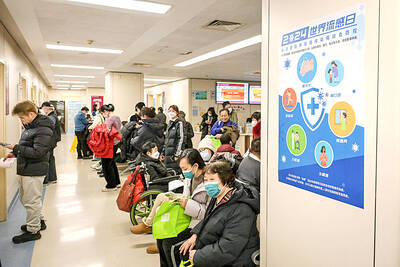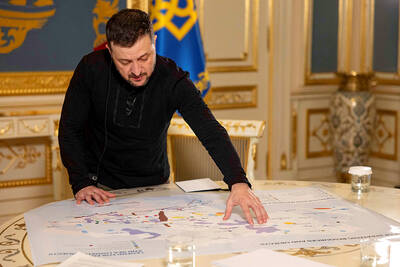Australian Prime Minister Kevin Rudd departed yesterday on his first big overseas trip, armed with plans to make his country more active in global affairs and bearing bad news for US President George W. Bush on Iraq.
Before departing, Rudd, elected four months ago as Australia's first new leader in more than a decade, outlined a foreign policy vision that contrasts with his predecessor by offering stronger support for the UN, while hinting at looser ties with Washington.
The first stop in a 17-day trip to Australia's most important strategic and economic partners is Washington, where Rudd will confirm his policy of withdrawing Australia's 550 combat troops from Iraq in a face-to-face meeting with Bush.
Rudd will then hold talks with UN Secretary-General Ban Ki-moon in New York before attending a NATO meeting in Bucharest, Romania, where he is expected to repeat Australia's demands for greater involvement in the security alliance's Afghanistan planning and press for more European troops in the war-torn country.
Other stops include London, Brussels and Beijing, where Rudd, a Mandarin-speaking former diplomat to China, will stress Australia's growing economic ties in Asia and Canberra's commitment to engaging with the region.
In a major speech late on Wednesday, Rudd said his government had spent its first three months in power focusing on domestic issues but was now turning its attention overseas.
He said Australia existed in an "increasingly joined-up world" with which it must become more engaged to meet economic, security and environmental challenges posed to all nations.
"The truth is, Australia's voice has been too quiet for too long across the various councils of the world," Rudd said in the speech. "That is why during the course of the next three years, the world will see an increasingly activist Australian international policy in areas where we believe we can make a difference."
The comment contrasts with the approach of his predecessor, conservative former prime minister John Howard, who was criticized for being too close to Washington, especially on the issue of Australia joining the 2003 invasion of Iraq, and letting Australia's relations with the UN erode.
After his election, Rudd quickly reversed Howard's policies on two controversial areas involving the US -- he signed the Kyoto Protocol on fighting global warming, leaving Washington isolated as a holdout among developed nations and he vowed to bring Australian troops home from Iraq.
Australia has some 1,500 troops in and around Iraq and Rudd has said he will pull out the combat contingent by the middle of this year, leaving the others in support roles. Australia's 1,000 troops in Afghanistan will not be changed.
Rudd said security, climate change and foreign aid would be among the issues for discussion with world leaders during his trip. But Australia's economic interests and the financial fallout from the global credit crunch would be at the top of his agenda.

Thousands gathered across New Zealand yesterday to celebrate the signing of the country’s founding document and some called for an end to government policies that critics say erode the rights promised to the indigenous Maori population. As the sun rose on the dawn service at Waitangi where the Treaty of Waitangi was first signed between the British Crown and Maori chiefs in 1840, some community leaders called on the government to honor promises made 185 years ago. The call was repeated at peaceful rallies that drew several hundred people later in the day. “This government is attacking tangata whenua [indigenous people] on all

RIGHTS FEARS: A protester said Beijing would use the embassy to catch and send Hong Kongers to China, while a lawmaker said Chinese agents had threatened Britons Hundreds of demonstrators on Saturday protested at a site earmarked for Beijing’s controversial new embassy in London over human rights and security concerns. The new embassy — if approved by the British government — would be the “biggest Chinese embassy in Europe,” one lawmaker said earlier. Protester Iona Boswell, a 40-year-old social worker, said there was “no need for a mega embassy here” and that she believed it would be used to facilitate the “harassment of dissidents.” China has for several years been trying to relocate its embassy, currently in the British capital’s upmarket Marylebone district, to the sprawling historic site in the

A deluge of disinformation about a virus called hMPV is stoking anti-China sentiment across Asia and spurring unfounded concerns of renewed lockdowns, despite experts dismissing comparisons with the COVID-19 pandemic five years ago. Agence France-Presse’s fact-checkers have debunked a slew of social media posts about the usually non-fatal respiratory disease human metapneumovirus after cases rose in China. Many of these posts claimed that people were dying and that a national emergency had been declared. Garnering tens of thousands of views, some posts recycled old footage from China’s draconian lockdowns during the COVID-19 pandemic, which originated in the country in late

BACK TO BATTLE: North Korean soldiers have returned to the front lines in Russia’s Kursk region after earlier reports that Moscow had withdrawn them following heavy losses Ukrainian President Volodymyr Zelenskiy on Friday pored over a once-classified map of vast deposits of rare earths and other critical minerals as part of a push to appeal to US President Donald Trump’s penchant for a deal. The US president, whose administration is pressing for a rapid end to Ukraine’s war with Russia, on Monday said he wanted Ukraine to supply the US with rare earths and other minerals in return for financially supporting its war effort. “If we are talking about a deal, then let’s do a deal, we are only for it,” Zelenskiy said, emphasizing Ukraine’s need for security guarantees